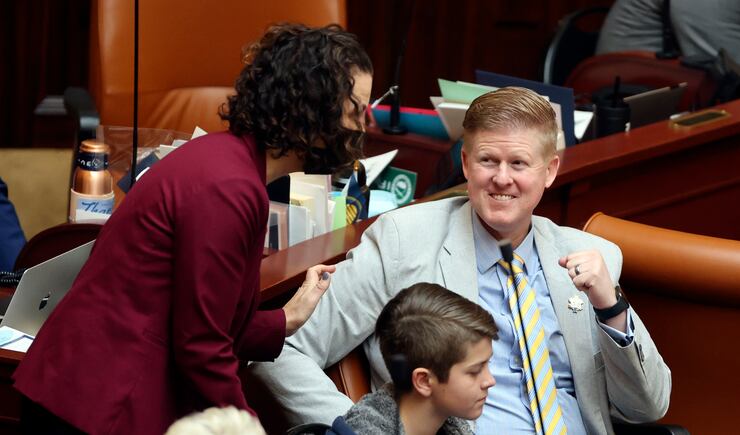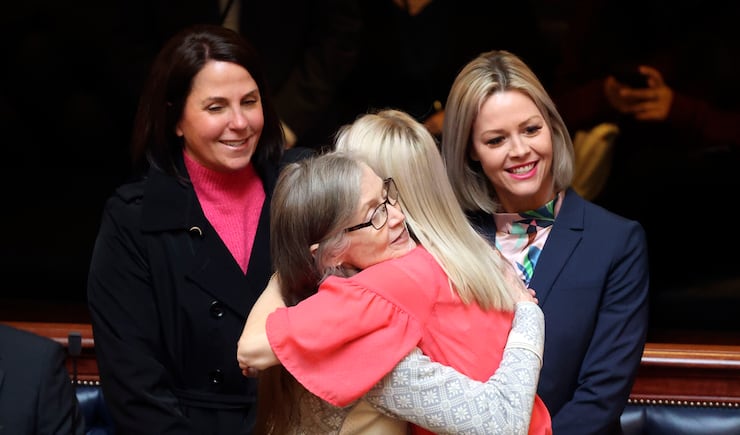A bill to give Utahns a $193 million tax cut — including a $163 million income tax rate reduction — has won final approval from lawmakers.
Without debate, the Senate voted 28-0 on Thursday to concur with the House of Representatives’ amended version of SB59, which won approval from the House on Wednesday.
It now goes to Gov. Spencer Cox, who said he’ll sign the legislation thanks to the addition of a first type of tax cut for Utah: a nonrefundable earned income tax credit.
“As a freshman legislator nine years ago, I supported an earned income tax credit to benefit low- and moderate-income Utahns,” Cox said in a prepared statement issued Thursday after the vote. “Every year since I have worked to get the EITC signed into law. I could not be more excited to finally get this piece of legislation across the finish line.”
Cox, in his budget recommendation earlier this year, recommended lawmakers use the $160 million they set aside for tax relief for a grocery tax credit. But Thursday, he applauded lawmakers for their approach this year.
“I also look forward to signing into law income tax cuts for all Utahns in addition to expanded Social Security tax cuts for Utah’s most vulnerable seniors,” Cox said. “I applaud the Legislature on their efforts in arriving at this bipartisan and balanced outcome.”
The bill includes a $163 million across-the-board income tax rate cut for all Utahns, dropping Utah’s income tax rate from 4.95% to 4.85%, plus a $16 million nonrefundable earned income tax credit and a $15 million expansion for the state’s Social Security tax credit, according to its sponsor, Sen. Dan McCay, R-Riverton.
“Good tax cut,” Senate President Stuart Adams, R-Layton, said after the vote, applauding the bill and McCay’s work.
The tax cut will cost the state about $193 million total in ongoing funds, plus $29.5 million in one-time funds. Due to its retroactive effective date on Jan. 1 of this year, it will impact next year’s budget by about $210.9 million.
“All together, these tax cuts will return hard-earned money to Utah families and alleviate current inflationary pressures,” Cox said. “These tax cuts are a tremendous win for Utah families and seniors, and I look forward to signing this bill into law.”
Legislative fiscal analysts estimate over 1.1 million Utahns will see tax savings of about $129 on average during the 2022 tax year. The expanded Social Security tax credit could result in an average yearly tax savings of about $210 for about 71,000 Utahns, while the nonrefundable state earned income tax credit may give an average of about $194 back to about 81,000 Utahns, according to the bill’s fiscal note.
Individual tax savings, of course, will vary based on filing status, family size, income and other factors.
House lawmakers added into the bill the earned income tax credit and the Social Security tax credit in a committee meeting last week, looking to provide more “targeted” tax cuts to low- and moderate-income Utahns.
House Republicans on Wednesday applauded the inclusion of a nonrefundable earned income tax credit. They said it would better target Utahns on the lower end of the income scale while also incentivizing work.








While some Democrats voted against the bill in the House after unsuccessful attempts to change the bill to repeal the state’s portion of the sales tax on food, the tax cut faced no opposition in the Senate. All present Democrats voted in favor of it.
The addition of the earned income tax credit and Social Security appeared to be enough to win Democratic senators’ votes.
“It’s appealing now,” Senate Minority Whip Luz Escamilla, D-Salt Lake City, told reporters in a Senate leadership availability on Wednesday after the House approved the bill. “It wasn’t appealing before,” she said, when it only included an income tax rate cut that would disproportionately benefit higher earning Utahns.
Thanks to the House’s additions of more targeted cuts for Utahns on the lower end of the state’s income scale and for retirees on fixed incomes, the bill saw broader support in the Senate.
The proposals all took shape in closed-door caucus meetings as Republicans have favored them as add-ons to an income tax rate cut — more so than the governor’s recommendation to give Utahns a tax cut in the form of a $160 million grocery tax credit, and decidedly more than Democrats’ and poverty advocates’ preference to repeal the state’s portion of the sales tax on food.











